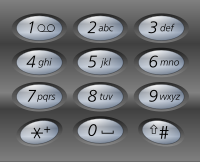[LeetCode April Challange] Day 08 - Letter Combinations of a Phone Number
Given a string containing digits from 2-9 inclusive, return all possible letter combinations that the number could represent. Return the answer in any order.
A mapping of digit to letters (just like on the telephone buttons) is given below. Note that 1 does not map to any letters.

Example 1:
Input: digits = "23"
Output: ["ad","ae","af","bd","be","bf","cd","ce","cf"]
Example 2:
Input: digits = ""
Output: []
Example 3:
Input: digits = "2"
Output: ["a","b","c"]
Constraints:
- 0 <= digits.length <= 4
- digits[i] is a digit in the range ['2', '9'].
Solution
DFS
Time complexity : O(4^n)
Space complexity : O(n)
class Solution {
public:
vector<string> letterCombinations(string digits) {
ans = {};
if (digits == "") return ans;
m[2] = "abc";
m[3] = "def";
m[4] = "ghi";
m[5] = "jkl";
m[6] = "mno";
m[7] = "pqrs";
m[8] = "tuv";
m[9] = "wxyz";
string cur = "";
dfs(cur, digits);
return ans;
}
private:
string m[10];
vector<string> ans;
void dfs(string &cur, string &digits) {
if (cur.length() == digits.length()) {
ans.push_back(cur);
return;
}
int i = cur.length();
for (char c: m[digits[i]-'0']) {
cur.push_back(c);
dfs(cur, digits);
cur.pop_back();
}
}
};
使用 backtracking 的技巧,歷遍所有排列組合。
BFS
Time complexity : O(4^n)
Space complexity : O(4^n)
class Solution {
public:
vector<string> letterCombinations(string digits) {
if (digits == "") return {};
string m[10];
m[2] = "abc";
m[3] = "def";
m[4] = "ghi";
m[5] = "jkl";
m[6] = "mno";
m[7] = "pqrs";
m[8] = "tuv";
m[9] = "wxyz";
vector<string> ans = {""};
for (char d: digits) {
vector<string> next;
for (string s: ans) {
for (char c: m[d-'0'])
next.push_back(s+c);
}
ans.swap(next);
}
return ans;
}
};